Any responsible citizen of the world has to visit COPE when they go to Vientiane. It is the NUMBER 1 thing to see in that city. COPE - Cooperative Orthotic and Prosthetic Enterprise - is an incredible organization that is trying nobly to empower and enable those whose lives have been drastically altered due to the loss of limbs caused by un-exploded ordinance (UXO) during the Vietnam War. COPE now has a wider scope where they are trying to help people with any/all disabilities establish meaningful lives. It is one of the most eye opening experiences you will ever see and it is very personal too. We first heard about COPE from one of our friends who has a long association with Laos. Also, on my way to Vientiane I happened upon an article in the Sydney Morning Herald that convinced me to go. Unknown to me Queenie had also looked at some Chinese websites and when I mentioned COPE to her she said that those websites also recommended COPE as the NUMBER 1 THING TO DO IN VIENTIANE. So we went and WOW did we learn! If you are in Vientiane you just have to go. No debate!
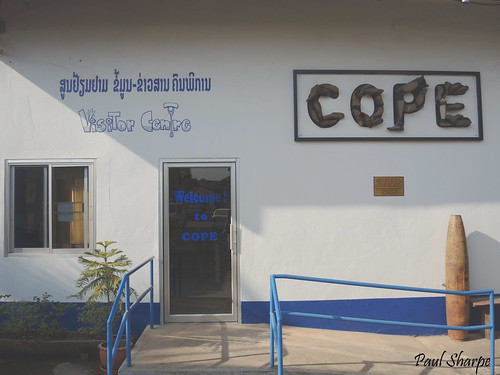
Entrance to COPE Visitor Center
Why COPE?
Why do we need COPE? Well since Laos is the most heavily bombed country in the world many UXO remain, wreaking havoc on villagers in the countryside and tearing off their limbs . During the Vietnam War the Americans unleashed hell on earth on that small country to try and shut down supply lines to the North Vietnamese. Just to be clear, this is not propaganda. You can read the following report from the US State Department
"During the Vietnam War, over 2.5 million tons of U.S. munitions were dropped on Laos. This is more than was dropped on Germany and Japan combined in the Second World War. On a per capita basis, Laos is the most heavily bombed country in history. Up to 30 percent of the bombs dropped over Laos failed to detonate. U.S. –origin aerial weaponry accounts for a large proportion of the unexploded ordnance that is still a significant threat to public safety in Laos. The explosive remnants of war continue to impede development and cause hundreds of casualties a year. While Laos also has a landmine problem, unexploded ordnance is a much greater threat to the population, especially because of the value of UXO scrap metal, the pursuit of which brings individuals into direct contact with the weapons. Explosive remnants of war from land battles constitute a significant third threat. Population growth in rural areas and other socio-economic trends are increasing demand to put UXO-contaminated land into production, a development that also increases human contact with all of these dangerous remnants of war."
The biggest UXO threat are unexploded cluster bombs that lie buried in the jungle. While organizations are trying to clear the countryside 30 years after the last bombs fell, people are still susceptible to being hurt.
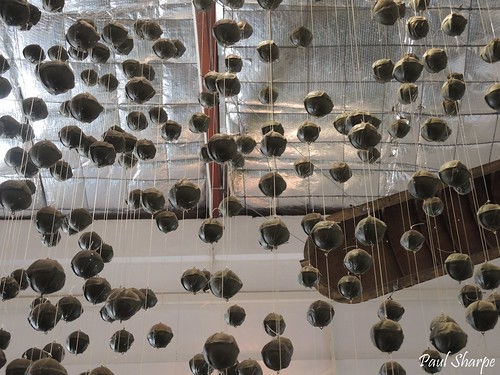
Of course there were many other types of UXO in Laos and the visitor center has some of the casings from some of the UXO they have recovered.
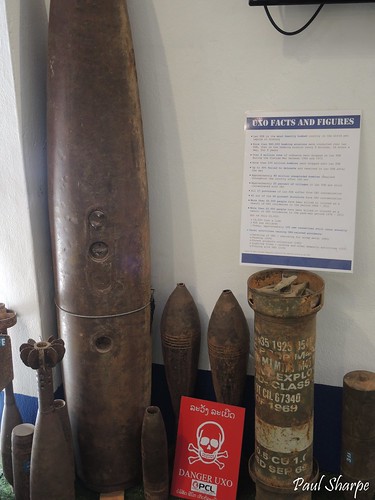
Cases from other Unexploded Bombs
There is a clear map of the bombing missions run by the Americans in Laos. You can see a better map by doing a Google Search but the map below shows clearly that most of Laos was hit by bombs. I can only imagine the fear and terror that people must have endured during this time.
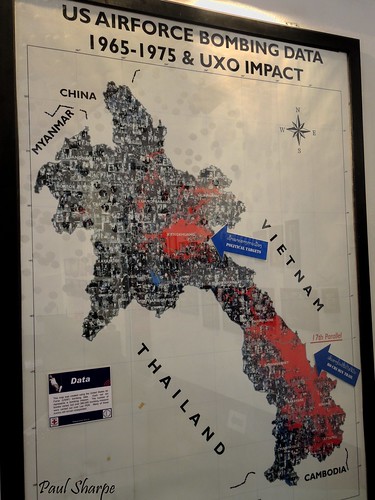
Map of American Bombing Missions
What does COPE Do?
Part of what COPE does is go around to villages to find people who have lost limbs due to the UXO. Very often people do not know that help and assistance is available so make there own home-made prosthetic. Of course these home-made contraptions, while functional, are not optional. When COPE manages to help a person to replace a home-made prosthetic with a proper one, they ask the person to donate the home-made one to the center where they hang them up for people to see. Some of these are shown below.
Part of what COPE does is go around to villages to find people who have lost limbs due to the UXO. Very often people do not know that help and assistance is available so make there own home-made prosthetic. Of course these home-made contraptions, while functional, are not optional. When COPE manages to help a person to replace a home-made prosthetic with a proper one, they ask the person to donate the home-made one to the center where they hang them up for people to see. Some of these are shown below.
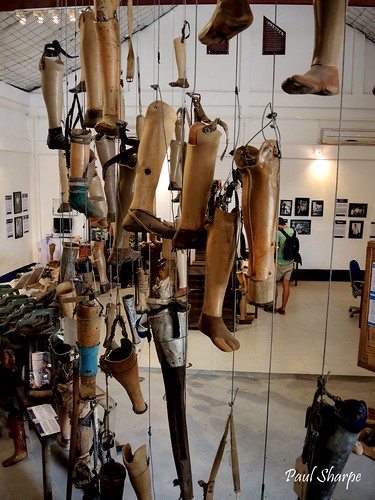
Home Made Prosthetic Legs
The most emotionally difficult prosthetic legs to see are the ones made for small children realizing that young kids are exposed to these terrifying dangers in the daily milieu of their life. Tragically, many kids are hurt because they try to get the UXO to sell as scrap metal (for pennies literally) which is incredibly dangerous. The risks are just not worth it ever.
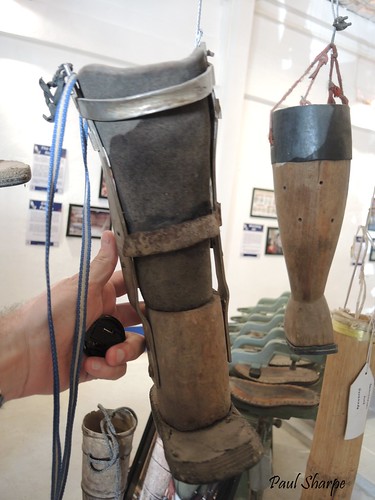
Home Made Prosthetic for Adult & Child
The one story COPE highlighted was that of Singing (see the picture below). As per the attached plaque, Singin's leg was shattered by a BLU 24 cluster bomb. "He made is own prosthesis carved from a solid piece of wood. The metal rim is made from salvaged metal. The source.....Part of a BLU 24 casing."
Singin "kindly donated his home made leg to the COPE visitor center as he had received a polypropylene leg for the first time - 36 years after his accident."
Singin "kindly donated his home made leg to the COPE visitor center as he had received a polypropylene leg for the first time - 36 years after his accident."
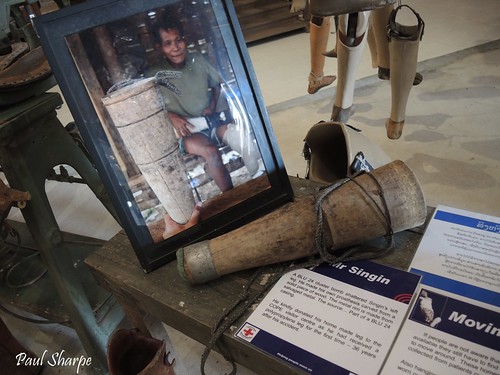
Mr. Singin's Story
It is also great to know that COPE does not just focus on helping and assisting those that have been affected by UXO. Their scope is much broader and they are there to help anyone that suffers from disabilities. There were many plaques on the wall with stories of where they have helped and what they have done. They also provide aid and assistance to people who have severe car accidents. This is becoming an increasing in Laos with modernization and a rapid increase in the number of motorized vehicles on the road. Two of these are shown below.
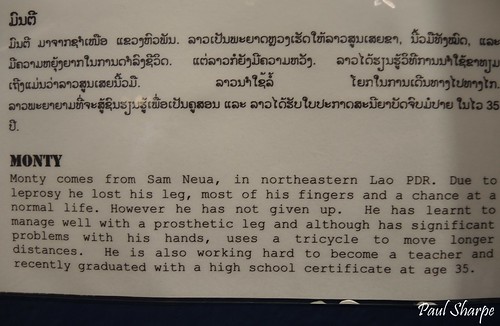
Monty's Story
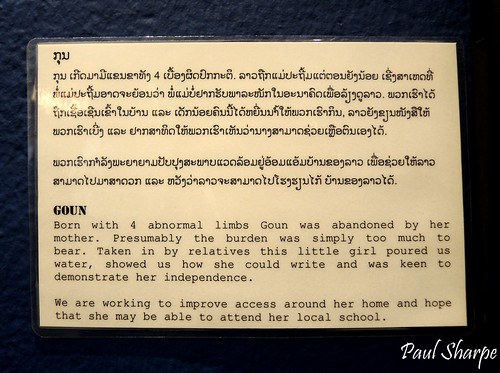
Goun's Story
Helping Those in Need
The reality of the challenges of these people struck home hard when we were getting ready to take our two day slow boat down the Mekong River from Huay Xuay to Luang Prabang. We got to the boats very early and were sitting in a small cafe having some refreshments where we met the young 5 y/o Fovin. Fovin was mostly blind, deaf, couldn't speak, couldn't walk and had no control of his hands. COPE reaches out to families like this to provide meaningful assistance to the families so that the lives and humanity of all are honored and respected. Although we took a picture of this young boy crying, he was just wanting some attention. As soon as you touched his chest softly or gave him some food we would give the most delightful laugh. He was well dressed and well loved and the people around him were blessed with so much patience.
The reality of the challenges of these people struck home hard when we were getting ready to take our two day slow boat down the Mekong River from Huay Xuay to Luang Prabang. We got to the boats very early and were sitting in a small cafe having some refreshments where we met the young 5 y/o Fovin. Fovin was mostly blind, deaf, couldn't speak, couldn't walk and had no control of his hands. COPE reaches out to families like this to provide meaningful assistance to the families so that the lives and humanity of all are honored and respected. Although we took a picture of this young boy crying, he was just wanting some attention. As soon as you touched his chest softly or gave him some food we would give the most delightful laugh. He was well dressed and well loved and the people around him were blessed with so much patience.

Fovin
What I loved about COPE was that although it makes you very aware through movies and graphics about the UXO, it is not a place for victims. It is a proactive organization that is trying to make a meaningful and practical difference in the lives of many people in Laos. One of their innovations is a "hand-bicycle" shown below. Basically if the user doesn't have legs, they use their hands by pulling on the lever between their legs. These bicycles are given away for free to people who need them. I tried to use one but couldn't get used to it. The cool part is is that they go both forwards and backwards. It is an awesome innovation.
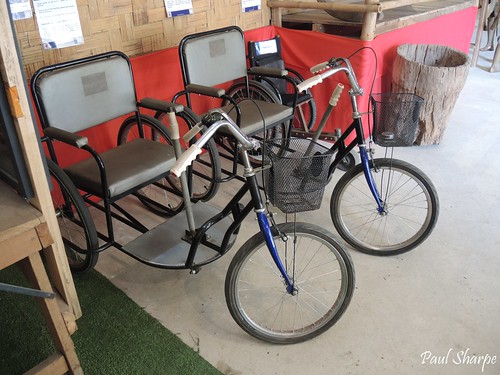
Bicycles for the Disabled
You can see use trying to use the hand-bikes in the video below. It was more difficult than I thought it would be but once you get the hang of it it would be easy.
Ban Cluster Bombs
Although this is purely a travel blog (and we never really get political here) I would say a final word about cluster bombs. It was amazing to both of us that despite the evidence that these bombs cause pain and destruction DECADES after the war, the US has still not signed the treaty to ban them and pay very little money (visibly) to support the needs of the people in Laos and to help the clean up of the Laos countryside. These types of UXO have caused severe suffering (not only through injury and death) but also by preventing farmers from using their land to produce food for themselves. It is incredulous to me that the US, despite now knowing how damaging and ineffective these weapons are, continue to keep them in their armory. According to the UN: "Cluster munitions have a "wide-area effect", which makes them inherently inaccurate when used. Moreover, unexploded duds lying around form a life-threatening hazard for civilians long after conflict." Although over 100 states have signed the treaty to date, the biggest states in the world; i.e. the US, China and Russia; have not. Very sad.
Although this is purely a travel blog (and we never really get political here) I would say a final word about cluster bombs. It was amazing to both of us that despite the evidence that these bombs cause pain and destruction DECADES after the war, the US has still not signed the treaty to ban them and pay very little money (visibly) to support the needs of the people in Laos and to help the clean up of the Laos countryside. These types of UXO have caused severe suffering (not only through injury and death) but also by preventing farmers from using their land to produce food for themselves. It is incredulous to me that the US, despite now knowing how damaging and ineffective these weapons are, continue to keep them in their armory. According to the UN: "Cluster munitions have a "wide-area effect", which makes them inherently inaccurate when used. Moreover, unexploded duds lying around form a life-threatening hazard for civilians long after conflict." Although over 100 states have signed the treaty to date, the biggest states in the world; i.e. the US, China and Russia; have not. Very sad.
Stand up for COPE!
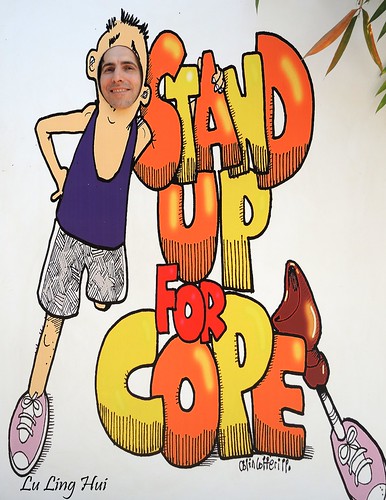
Stand Up for COPE
To end this post on this incredible organization, we should end in a proactive way by asking what can we do to help them. I think the first is to be aware and educated about the challenges that Laos faces with respect to UXO, to be aware of issues surrounding cluster bombs themselves and, if you are in Vientiane, you can visit the center to receive a good education about the issues that this country faces. Secondly, and more importantly, you could visit the website @ COPE - Cooperative Orthotic and Prosthetic Enterprise and donate money. I am sure your money will be put to good use. The third thing you can do is make others aware of the problem by directing them to the COPE website and sharing what you know about the problems with them.
Although it was a very eye opening experience, it was also a very hopeful one as it is a place that offers hope and assistance to those who desperately need it. COPE for me is the NUMBER 1 thing to do in Vientiane. Go, learn, reflect and act!
Although it was a very eye opening experience, it was also a very hopeful one as it is a place that offers hope and assistance to those who desperately need it. COPE for me is the NUMBER 1 thing to do in Vientiane. Go, learn, reflect and act!
More stories from our trip in Laos a.k.a. "The Jewel of the Mekong"
when we visited COPE, i was very moved by what they were doing. i emptied my pockets in the donation box. i subscribe to their newsletter, which is worthwhile. thanks for covering this important topic Paul.
ReplyDeleteHi MJ - thanks for your comment again. Yes, it was a very moving experience for us too. What I was really amazed by though was how proactive and forward looking they are. There seems to be no bitterness or anger. The history is there because that is what happened. Now it's time to move on.
DeleteYes, they are doing a lot of worthwhile stuff. Unfortunately now there is no donation box. Have to do it with credit card. We will donate something in the future but you are right, it is a worthy cause to give money too.
Thanks again for reading and commenting. Your insights are always appreciated.